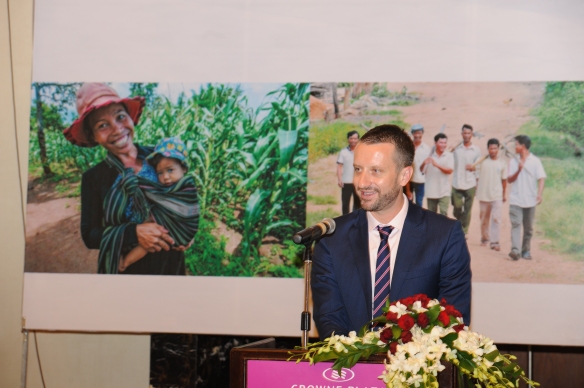Mr Layton Pike – Deputy Head of Mission
Thank you Professor Dang for your engaging opening remarks.
Distinguished guests, ladies and gentlemen:
I am pleased to be here this morning for the opening of this workshop on gender-responsive agricultural research.
At the outset, I’d like to acknowledge the vision of the hosts in holding a workshop of this kind. I understand from my colleagues that the idea for this workshop came from a cassava-obsessed Queensland researcher ‘who saw the light’ on how important gender issues were to agricultural research and outcomes in South East Asia. By the number of participants in the room today (around 60) from both Vietnam and Australian research agencies and NGOs, it is clear that his interest is shared.
This workshop is also a terrific model of collaboration.It is commendable to bring together academics and development practitioners – to stare into each others’ eyes – and to find a common language and tools to serve this gender work well.I am especially pleased of the collaboration between the host agencies – ACIAR, CIAT, IFGS and DFAT.Thanks are especially due to Doctors Dindo Campilan, Jono Newby and Nozomi Kawarazuka at CIAT; to Prof Dang at the Institute for Family and Gender Studies at the Vietnam Academy of Social Sciences; to Dr Rodd Dyer, An Nguyen and the team at ACIAR; and to my team at DFAT.
Many of you, as our partners, would be well aware that Australia places a strong emphasis on promoting gender equality and women’s empowerment.This is across all of our work – in foreign policy, in trade and economic diplomacy, and in our development cooperation program.
In Vietnam, this commitment is endorsed at the highest level.At our high level consultations in 2015, Australia and Vietnam agreed that ‘promoting women’s economic empowerment, including among ethnic minorities’ will be one of the three pillars of our Aid Investment Plan for 2016-2020.As a result, over the next 5 years, Australia is planning to invest close to A$40 million to improving women’s economic and social participation and status. We see the promotion of a gender equality as a whole of Embassy concern.
Within ACIAR, we are proud that the Vietnam country program is supporting research projects explicitly working with women smallholder farmers, and is partnering with the Vietnam Women’s Union.The vegetable project in the North West Mountainous region was launched by our Minister, Julie Bishop, in 2014 and continues to be an important lighthouse for understanding women’s involvement in agricultural markets in Vietnam.
Within DFAT, Australia is designing a major investment for rural and ethnic women’s economic empowerment.The program is the Gender-Responsive Equitable Agriculture and Tourism, or ‘GREAT’ for short. GREAT builds on Australia’s past engagement with rural communities in Vietnam to help the women of Sơn La and Lào Cai to beneficially engage in profitable markets. GREAT will commence in 2017 for an initial five-year period.
Vietnam is deservedly recognised for its achievements in closing the gender gap in education, and in promoting women’s participation in the formal sector labour force.However – as elsewhere – a number of gender equality challenges persist.Within the agriculture sector, women play a major role in production, and yet their economic returns are typically low.There is an acute need to reduce women’s labour burdens, increase the returns on their labour, and increase their decision-making influence and their leadership within the sector as a whole.
With the backdrop of a ‘feminisation’ of agriculture in Vietnam, particularly in regions such as the northern mountains, ‘strengthening the gender lens in agricultural production and value-chain research’ is vital.It is vital for the adoption and diffusion of improved agricultural techniques.And it is vital for drawing attention for the development of better policy, programs and support for smallholder farming households.
I’d like to close by affirming that we are proud of the long standing cooperation between Australian and Vietnamese agricultural research institutions.We believe that improving the terms of women’s engagement in agriculture will contribute to the socio-economic development of this country.I urge you to make the most of this workshop and of the chance for learning across disciplines, agencies and countries.
I look forward to the increased and new collaborations this workshop generates between Vietnam and Australia.
Thank you

